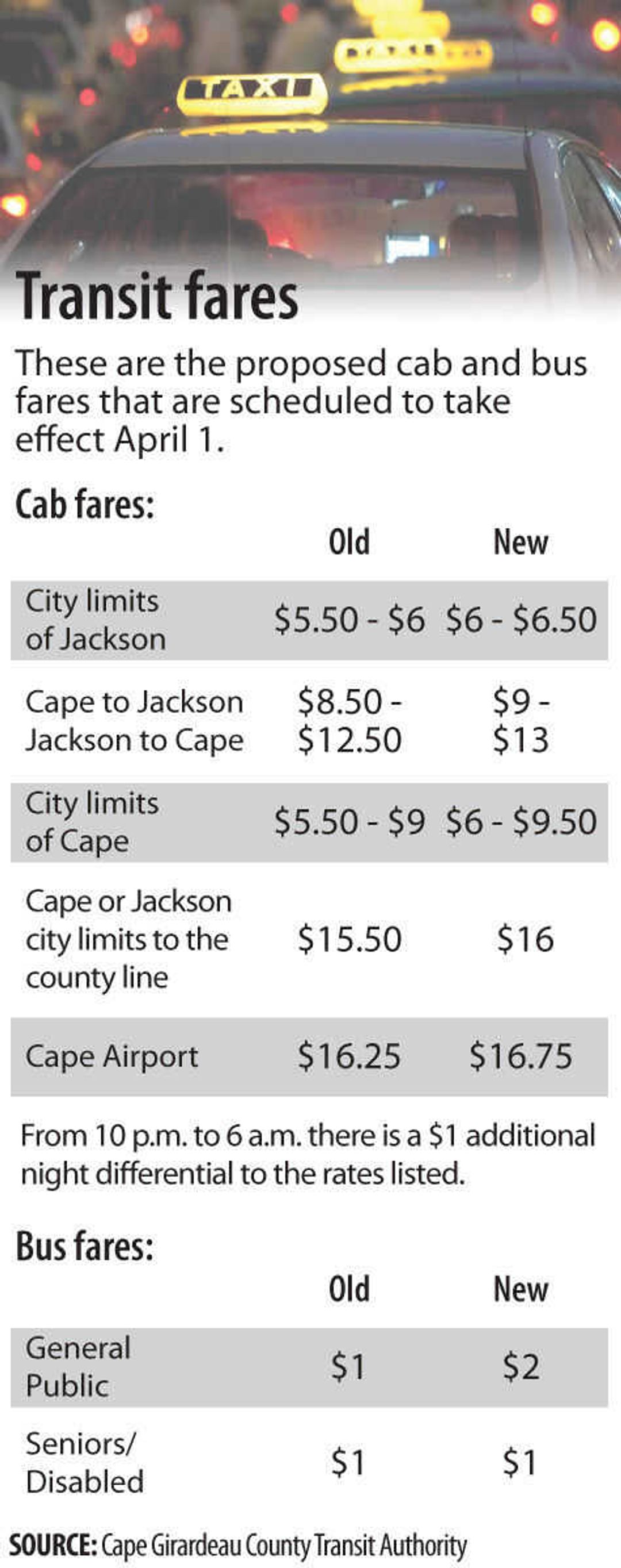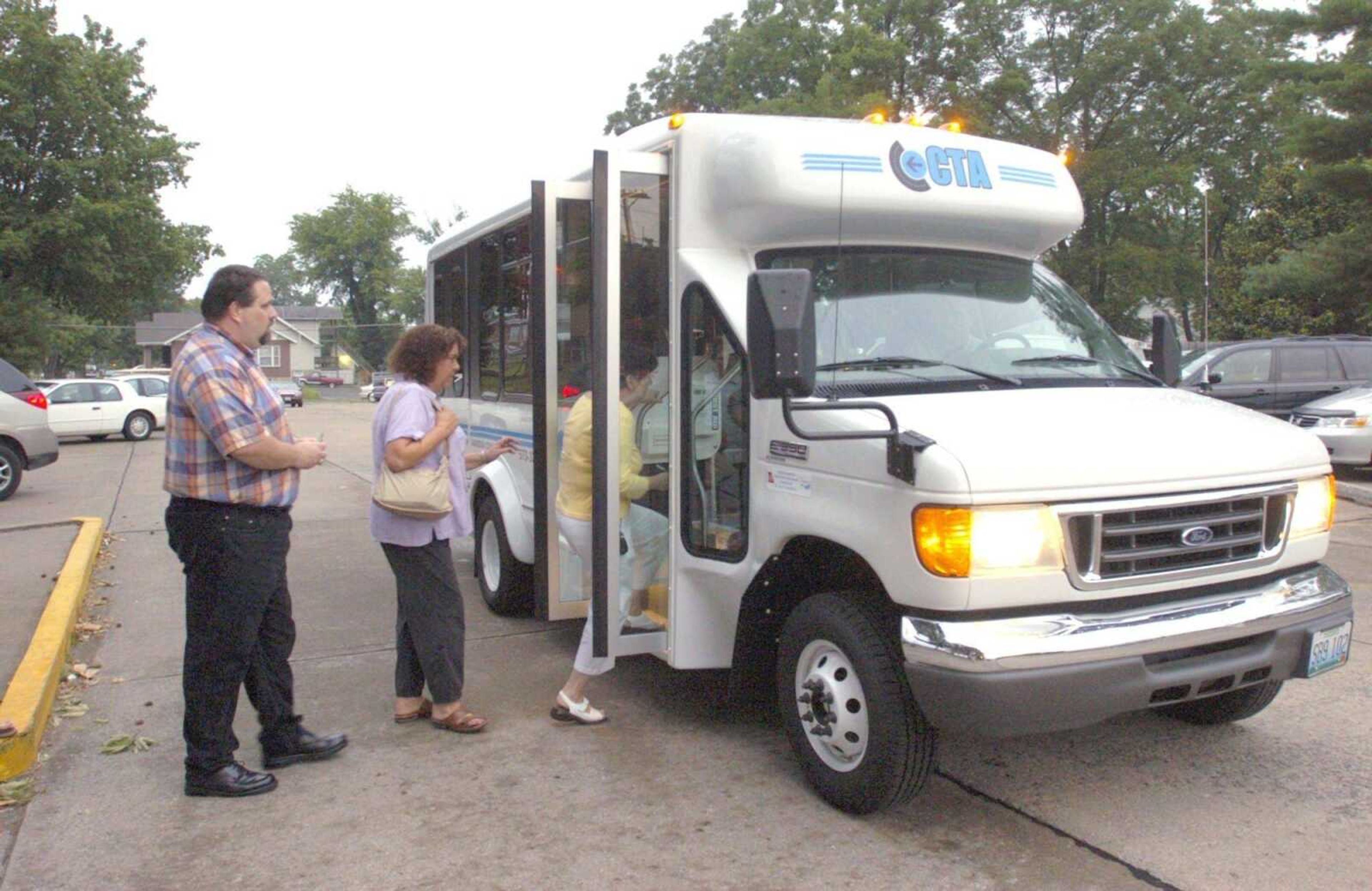High gas prices fueling county transit rate increases
Escalating gas prices are now even hitting the wallets of those who rely on others for a ride. The Cape Girardeau County Transit Authority, which bought nearly 100,000 gallons of fuel last year, is increasing its cab rates by about 50 cents per one-way trip and its fixed-route bus rates by $1 per ride, officials say, in an attempt to recoup some of the money that is being hemorrhaged by the ever-increasing price at the pumps...
Escalating gas prices are now even hitting the wallets of those who rely on others for a ride.
The Cape Girardeau County Transit Authority, which bought nearly 100,000 gallons of fuel last year, is increasing its cab rates by about 50 cents per one-way trip and its fixed-route bus rates by $1 per ride, officials say, in an attempt to recoup some of the money that is being hemorrhaged by the ever-increasing price at the pumps.
"We can't keep absorbing this fuel cost without doing something," said Tom Mogelnicki, executive director of the transit authority.
The rates are set to take effect April 1, following a 1 p.m. public hearing today at the transit authority's 937 Broadway's offices. It is the second increase in the past five years, the last taking place in September 2010, which was also a 50-cent increase.
Some who use the authority's Cape Girardeau fixed-route bus system will see a $1 increase, as the public will now pay $2 instead of $1 per ride. Seniors over the age of 60 and the disabled will not see an increase, as their rates will stay at $1, Mogelnicki said.
The transit authority's countywide cab system will see 50-cent increases per ride. Under the current pricing, for example, rides within the city limits of Jackson run anywhere from $5.50 to $6. Under the new rates, that range will increase from $6 to $6.50, depending on which of Jackson's three zones a rider is going. Rides to any one of Cape Girardeau's eight zones will cost $6 to $9.50.
Rides from Cape Girardeau to Jackson, or vice versa, will climb to $9 to $13 and the rate from Cape Girardeau and Jackson's city limits to anywhere in the county will jump to $16.
Cape Girardeau resident Barb Gerber rides the city buses about four times a week, whether she's going to the supermarket, West Park Mall or the doctor's office. While 50 cents may not seem like much, she said, it could hit some people hard in this tough economy.
"Well, what can I say?" she said. "No matter what I feel, they're going to do it regardless. I'm grateful we have such a service. But I wish they would make more stops more frequently. But there's nothing I can do about it. I have to go along. I need them."
That the rates will have an effect on riders isn't lost on Mogelnicki. He said he hates to do it but countered that the increase should be actually be double that to more adequately account for the losses. In February, the heavily subsidized agency used 8,000 gallons of gas, which is costing it about $25,000 a month to fuel the 30 vehicles, a combination of buses, wheelchair-accessible vans and cabs.
But Mogelnicki estimates that rate increase will only generate about a fourth of that amount, because roughly 70 percent of those who ride Cape Girardeau's bus system are seniors and the disabled, who won't see an increase. He predicts that the cost of fuel could reach $30,000 a month.
"I can see that it may be a hardship for some," Mogelnicki said. "But in all reality if they want transportation at all, I have to break even. If I can't break even, I'll have to shut down. It's as simple as that."
The transit authority has an annual budget of about $1.8 million, much of which comes from governmental agencies. For example, Cape Girardeau contributes $110,000 a year; Jackson gives about $7,500; $70,000 comes from the Cape Girardeau County Commission; and the largest donor at $630,000 is the Federal Transit Administration. The transit authority also receives some money from the Missouri Department of Transportation.
According to an audit that was presented Thursday to the county commission, the cab services generated $451,470 in fares for the fiscal year ending June 30 and the bus system generated $27,597. The net assets of the transit authority, as of June 30, stood at about $547,539. For that same period, salaries and wages accounted for $916,118 and fuel cost for the most recent fiscal year was $256,875. Van maintenance cost nearly $100,000. At present, the transit authority has four administrative positions and 45 drivers with starting salaries at the federal minimum wage of $7.25 per hour.
Overall, ridership seems to be steady, Mogelnicki said. Total ridership was 139,350 in the fiscal year -- 44,090 bus riders and 95,260 cab riders. The average riders per month in 2010 was about 12,173 a month, according to the audit. The amount of fuel used has generally grown over the past five years, according to statistics provided by Mogelnicki. In 2007, the agency bought 65,923, which grew to 84,495 in 2008; 105,825 in 2009; 109,493 in 2010, and dropped slightly last year to 94,024. So far this year, the transit authority has bought 16,470 in January and February.
Cape Girardeau Mayor Harry Rediger said the service is much needed, especially the relatively new bus service that began in 2007. But he is somewhat concerned, he said, after hearing some complaints from riders about safety. One claimed a driver drove too fast and erratically, and another groused that the buses are in need of maintenance.
"We want to make sure it's a safe system and that they are given good customer service," Rediger said, noting that city staff has been in contact with the transit authority to address the issue. "But it is needed, so I feel we want to do everything we can to make it work, make it safe and make it accessible to most people."
Commissioner Paul Koeper said he understands fuel rates are a problem for many different agencies.
"We're all trying to corral it and keep it in order," he said. "I hate to see this hit anybody hard. The ideal thing in this world would be to give free rides to everyone, but that just can't happen."
smoyers@semissourian.com
388-3642
Pertinent address:

937 Broadway, Cape Girardeau, MO
Connect with the Southeast Missourian Newsroom:
For corrections to this story or other insights for the editor, click here. To submit a letter to the editor, click here. To learn about the Southeast Missourian’s AI Policy, click here.









